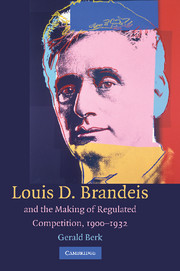Crossref Citations
This Book has been
cited by the following publications. This list is generated based on data provided by Crossref.
Berk, Gerald
and
Galvan, Dennis
2009.
How people experience and change institutions: a field guide to creative syncretism.
Theory and Society,
Vol. 38,
Issue. 6,
p.
543.
Maser, Steven M.
and
Thompson, Fred
2010.
Dispelling Fear and Loathing in Government Contracting: A Proposal for Cultivational Governance in DOD Source Selections.
SSRN Electronic Journal,
Pandya, Sachin S.
2011.
The First Liability Insurance Cartel in America, 1896–1906.
Law and History Review,
Vol. 29,
Issue. 2,
p.
375.
Schneiderhan, Erik
2011.
Pragmatism and empirical sociology: the case of Jane Addams and Hull-House, 1889–1895.
Theory and Society,
Vol. 40,
Issue. 6,
p.
589.
Harris, Howell
2012.
Coping with Competition: Cooperation and Collusion in the US Stove Industry, c.1870–1930.
Business History Review,
Vol. 86,
Issue. 4,
p.
657.
John, Richard R.
2012.
Robber Barons Redux: Antimonopoly Reconsidered.
Enterprise and Society,
Vol. 13,
Issue. 1,
p.
1.
John, Richard R.
2012.
Robber Barons Redux: Antimonopoly Reconsidered.
Enterprise and Society,
Vol. 13,
Issue. 1,
p.
1.
SKLANSKY, JEFFREY
2012.
THE ELUSIVE SOVEREIGN: NEW INTELLECTUAL AND SOCIAL HISTORIES OF CAPITALISM.
Modern Intellectual History,
Vol. 9,
Issue. 1,
p.
233.
Chausovsky, Jonathan
2013.
From Bureau to Trade Commission: Agency Reputation in the Statebuilding Enterprise.
The Journal of the Gilded Age and Progressive Era,
Vol. 12,
Issue. 3,
p.
343.
Maser, Steve M.
and
Thompson, Fred
2013.
Dispelling fear and loathing in government acquisition: A proposal for cultivational governance in dod source selections.
Journal of Public Procurement,
Vol. 13,
Issue. 03,
p.
289.
2013.
The American State from the Civil War to the New Deal.
p.
138.
Sheingate, Adam
2014.
Institutional Dynamics and American Political Development.
Annual Review of Political Science,
Vol. 17,
Issue. 1,
p.
461.
Johnston, Robert D.
2014.
Long Live Teddy/Death to Woodrow: The Polarized Politics of the Progressive Era in the 2012 Election.
The Journal of the Gilded Age and Progressive Era,
Vol. 13,
Issue. 3,
p.
411.
Clemens, Elisabeth S.
2015.
Organizing Powers in Eventful Times.
Social Science History,
Vol. 39,
Issue. 1,
p.
1.
John, Richard R.
2015.
Prophet of Perspective: Thomas K. McCraw.
Business History Review,
Vol. 89,
Issue. 1,
p.
129.
BOUGETTE, PATRICE
DESCHAMPS, MARC
and
MARTY, FRÉDÉRIC
2015.
When Economics Met Antitrust: The Second Chicago School and the Economization of Antitrust Law.
Enterprise & Society,
Vol. 16,
Issue. 2,
p.
313.
Amberg, Stephen
2017.
Constructing Industrial Order in the Center of the American Economy: How Electoral Competition and Social Collaboration Evolved in Twentieth-Century New York.
Studies in American Political Development,
Vol. 31,
Issue. 1,
p.
108.
Rahman, K Sabeel
2017.
Democracy against domination: Contesting economic power in progressive and neorepublican political theory.
Contemporary Political Theory,
Vol. 16,
Issue. 1,
p.
41.
Sallet, Jonathan
2018.
Louis Brandeis: A Man for This Season.
SSRN Electronic Journal ,
TEIXEIRA, MELISSA
2018.
Making a Brazilian New Deal: Oliveira Vianna and the Transnational Sources of Brazil's Corporatist Experiment.
Journal of Latin American Studies,
Vol. 50,
Issue. 3,
p.
613.





